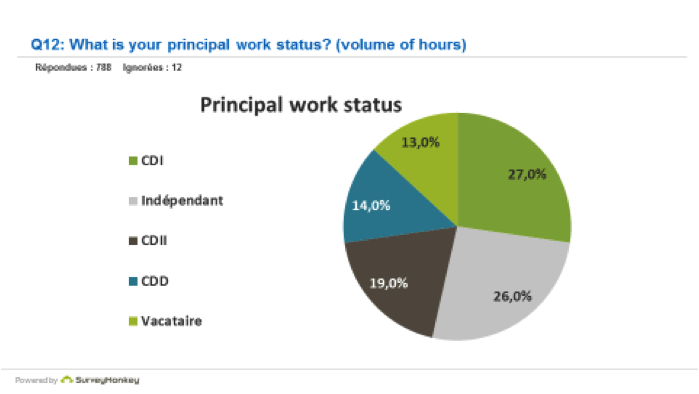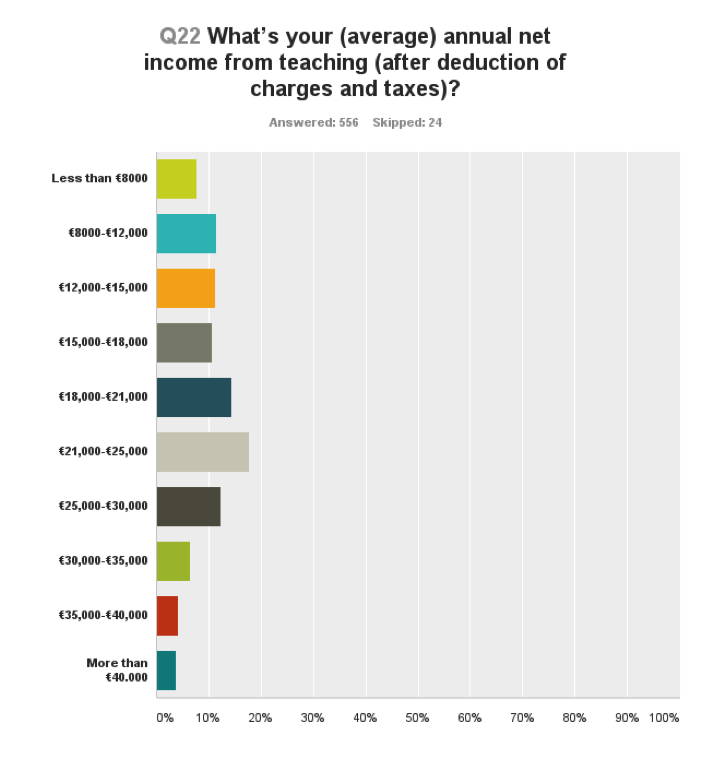My Tailor Is Not So Rich: Salaries and Conditions of ELT Trainers In France
This post represents something of a departure for EFL Magazine. In our continuing effort to provide new, interesting, and useful content to our readers, we are proud to present this study preformed by Bethany Cagnol, Claire Oldmeadow, Jane Ryder, Andrew Wickham, and Ros Wright. It reveals new information on the salaries of ELT trainers in France, and their economic concerns. We hope that this study will spark some discussion on salaries and working conditions, not just in France, but among ELT teachers as a whole. -Editor
Introduction
In 2014 we conducted a survey to investigate the real conditions and concerns of English language trainers who, at 80%, represent the majority of language teachers within the training market in France. We were primarily interested in the point of view of expats for whom language training is a career*.
Results
We polled some 800 trainers English language trainers across France; a representative sample of approximately 10%. Based predominantly in the Paris, Lyon and Toulouse regions, 66% possessed 10+ years’ experience in language training. Almost 1/3 indicated that being a native speaker, having professional experience and/or a university degree are often 
considered as valid as any language teaching qualification. Results indicated that a third of respondents have no specific teaching qualification. Just over 50% hold a teaching qualification, such as the CELTA, but few are trained to Diploma (10%) or MA (8%) levels.
Private language schools represent the main employer (43%) of ELT trainers, while 27% of trainers work predominantly in higher education. Only one quarter work for a single employer. The majority, 45%, have at least three employers, while 16% juggle up to six different employers.
Just under half have a continuous employment contract (CDI or CDII) as their main status, which means that 54% of trainers have no job security. Roughly a quarter work predominantly on a freelance basis, while 13% are mostly employed on fixed-term contracts (CDD) and 13% are mostly employed as vacataires: the equivalent of zero-hour contracts with minimal entitlement to sick pay, benefits and holiday pay and no unemployment benefits. The insecurity with these contracts is further compounded by additional administrative duties.
 Hourly rates are notoriously low. We found 1/3 earn less than 20€ gross/hr and a quarter of those who derive more than 70% of their income from teaching, earning the minimum wage (currently set at €13,500 net/£XXXXXXX a year) or less.
Hourly rates are notoriously low. We found 1/3 earn less than 20€ gross/hr and a quarter of those who derive more than 70% of their income from teaching, earning the minimum wage (currently set at €13,500 net/£XXXXXXX a year) or less.
Hourly rates for self-employed trainers indicated a huge disparity, with those at the top billing more than €50/hr. Rates at the lower end of the scale tended to be around €30/hr.
In the final section of the survey, respondents listed their principle concerns. Over 50% stated working conditions had deteriorated. This is further aggravated by lack of security, which in turn is due to the prevalence of fixed term and zero-hour contracts as well as a cap on the number of hours a year trainers are entitled work under such contracts.
For self-employed trainers, lack of income security and limited benefits are major concerns. Finally, the precarious nature of the profession means that few qualify for a full state pension and are forced to continue working past retirement age.
 Other areas of concern included bureaucracy and the constant fluctuation of employment and training laws. Finally, respondents expressed concerns about adapting to new technologies.
Other areas of concern included bureaucracy and the constant fluctuation of employment and training laws. Finally, respondents expressed concerns about adapting to new technologies.
New reform
Following the January 2015 reform on vocational training in France, we carried out a complementary poll in May to assess the immediate impact on trainers. Trainers working with private language schools or working directly with companies are being hardest hit by the reform.
Conclusion
It would seem that unlike the initial phrase from the 1929 coursebook, L’Anglais sans peine, known to entire generations of French learners, my teacher is [sadly not] rich and it is doubtful (s)he will become so in the near future. That said we felt it was important to first provide clear, reliable evidence of the situation on the ground. It is our fond hope that this initiative will encourage a wide ranging debate among trainers, institutions and publishers, lead to further research being conducted in other countries and to a search for positive, realistic solutions.
Footnote
*The survey excluded state education teachers, as their conditions could not be compared to those of trainers working with adult and young adult learners.
As experienced ELT specialists in France, we have long been concerned about the precarious nature of our profession. The proportion of those working on base-rate salaries, with relatively low job security, juggling multiple statuses and employers, is by all accounts on the increase. In the summer of 2014 we conducted an online survey to investigate the real conditions and concerns of language trainers. This article is a summary of that research.
Authors: Bethany Cagnol, Claire Oldmeadow, Jane Ryder, Andrew Wickham, Ros Wright





8 Responses
Helen Waldron
Excellent work. It really helps to see the results in black and white. Hope I have your permission to quote this report?
17/10/2015
Ron Morrain
Great article - I am sure that if such a study were to be carried out in Germany the results and numbers would not be any different.
18/10/2015
Chris Cotter
Hi Bethany, This is an excellent article, and this sort of information is very eye-opening! I'm curious if there are any significant differences in age, experience, degrees, etc. between different tiers of earners. Chris Heads Up English www.headsupenglish.com
18/10/2015
Liliane Belanger
If you knew what language trainers get in Rheinland-Pfalz universities, you'd sit down and cry. But a piece of good news: Luxembourg is very kind to ESL trainers.
19/10/2015
Bethany
Thanks for your interest in our study. If you do cite it, could you include all of the study's authors, please? Bethany Cagnol, Claire Oldmeadow, Jane Ryder, Andrew Wickham, and Ros Wright.
19/10/2015
Cara Leopold
Very interesting study: the low pay and job insecurity explain why I quit EFL teaching in France. I am coming back to it after a break to teach online. It's good to mention bureaucracy issues-not only are we badly paid, but we even struggle sometimes to actually get paid what with all the administrative headaches!
27/11/2015
Louise Nick
The situation is the same in the US, Germany, and Spain. I know, I've taught in the first two and am currently teaching in the third one. And it doesn't matter whether you teach public school, university or in private language academies. In the US, ESL teachers have to have a Masters degree to teach at the college level, but many of them receive contracts only for a quarter (10 weeks) or a semester, depending on the college's system. Full-time positions are few and far between. In Germany, private language academies work with university students and freelancers, offering between 9 and 12 Euros per hour, businesses offer 16-20 for classes on-site, when, as a freelancer in Germany, you have to pay up to 60% in social security and taxes. Travel time and time for prepping are 'included in the fee'. In Spain, it's mostly limited contracts for the duration of a course. Nobody pays travel time nor preptime. The German government pays thousands of Euros per Student for MobiPro classes, to get young Spaniards ready to begin apprenticeships in Germany, but the Spanish language academies getting these contracts pay their teachers the absolute minimum they can get away with. And that while MobiPro requires for these courses licensed teachers who are native speakers. It's crazy.
06/12/2015
Lynne Keenan
Thank you for carrying out such a detailed survey.It indeed confirms what most EFL teachers have known all along.We are underpaid,unrecognised professionals.It helps to look at the figures and realise that we are not alone. The next big question is what can be done about it?
21/03/2016